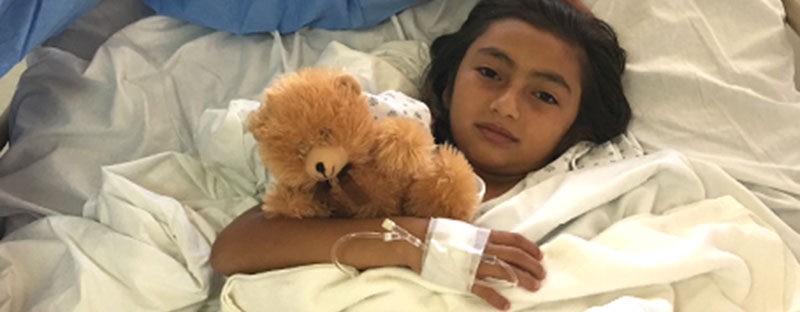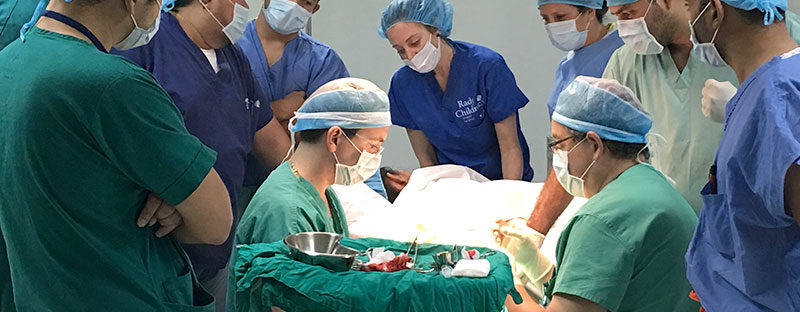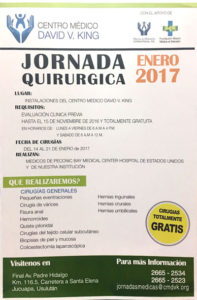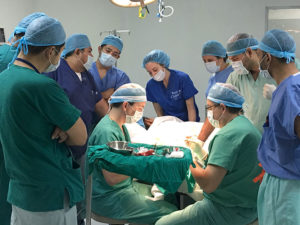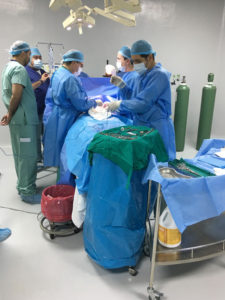NAME: Maritza Lisseth Garcia Gutierrez
AGE: 8
FROM: Chinameca
Maritza Lisseth was one of the few patients the American medical staff and doctors at the Centro Medico David V. King had to put to sleep under anesthesia. Only eight-years-old, she had two hernias that needed repair — for at least one she had undergone surgery when she was five-years-old.
Maritza’s father is extremely thankful for the center and the American medical team that performed surgeries
Maritza’s surgery was completely free, thanks to a medical mission trip staffed by general surgeon Dr. Agostino Cervone and medical staff from Peconic Bay Medical Center, in Riverhead, New York. The group — which included a resident surgeon, general physician, five nurses and two administration professionals — each committed to raising $1,500 to cover the cost of the trip. A donation of $10,000 subsidized the trip for the medical professionals.
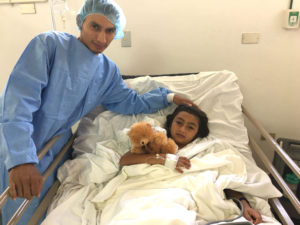
Eight-year-old Maritza Lisseth, with her father Jose, recovers after surgery to repair two hernias. Maritza benefited from a free surgery thanks to a medical mission trip led by Riverhead general surgeon Dr. Agostino Cervone and professionals from Peconic Bay Medical Center
Fundación Misión Médica de El Salvador — which administers CMDVK — organized the visit.
For Maritza’s father, Jose Pablo, he is extremely thankful for the center and the American medical team that performed surgeries during the third week in January. About a year and a half ago Jose and his wife noticed that the area below Martiza’s stomach was beginning to swell. From the neighboring village of Chinameca, Jose was familiar with the center, taking advantage of its pediatric services for both his daughter and his son. One day he saw a sign in the clinic that an American surgical team would arrive to perform procedures free of cost. The center is highly subsidized, patients are asked to pay around $2 per visit and may have to pay for special tests. While the center has operated since 2004 as a daily clinic, the operating rooms were added only two years ago. Medical missions help the center achieve it’s bottom line, either free or highly subsidized care for El Salvador’s most vulnerable population.
Jose says that before he heard of the medical mission, his family had started the process of putting Maritza in line for surgery at the national hospital. In the recovery room, protectively standing over his daughter, he was grateful the surgery took place in CMDVK. “The problem with the national center is that there is too much work for the staff and not enough attention given to the patients,” he says through a translator. “Here, it’s different.”
Jose, who works as a carpenter, says that for life in El Salvador, you work very hard to own very little and is extremely gracious for the team visiting El Salvador and the center. “Thanks to God, I am feeling good about the experience here.”
I ask Maritza if she wants to say anything else. Groggy from all the medication, she nonetheless looks up and says, “I wish many blessings for you.”

